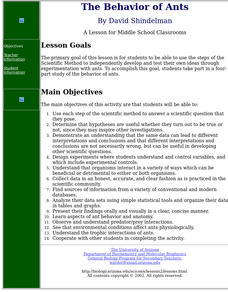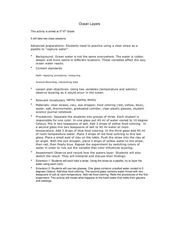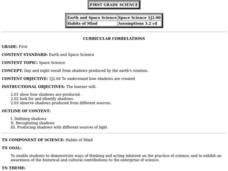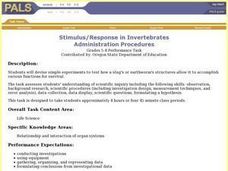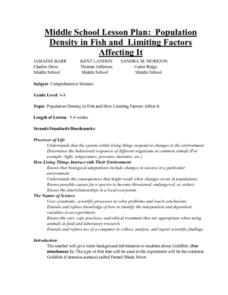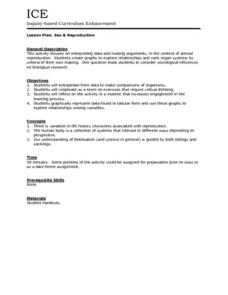Curated OER
The Behavior of Ants
Learners use the steps of the Scientific Method to develop and test their own ideas through experimentation with ants.
Curated OER
Rules of the Roll
Students roll a ball down a plank and measure the distance it travels. Students graph the distances the ball travels as they change the height of the incline (increase slope).
Curated OER
Protect the Skin You're in
Students explore the importance of sun safety in relationship to skin cancer prevention. They test the effectiveness of various sunscreens and administer and analyze a simple survey to their peers. In addition, they implement a public...
Curated OER
Density as a Unique Physical Property
Students find the density of objects by finding their mass and their volume. In this density lesson plan, students determine the mass of objects, the find the volume by using formulas or by water displacement and they calculate the...
Curated OER
Latent Heat of Fusion
Students conduct a series of investigation on latent heat of fusion. In this chemistry instructional activity, students explain how thermal storage systems work. They draw and interpret graphs.
Alabama Learning Exchange
"Like Terms", I Add Them
Ninth graders add and subtract polynomials. In this Algebra I lesson plan, 9th graders work practice problems as they view a PowerPoint presentation of the lesson plan. Both the horizontal and vertical methods of addition and...
Curated OER
Welcome To Program A Simple Program in C
Learners are introduced to the language in C programming. In groups, they determine the correct function to be used and practice running the program to achieve the desired results. They end the lesson by programming more difficult...
Curated OER
Tropical Atlantic Aerosols
Students analyze NASA data from the Multi-angle Imaging Spectroradiometer. In this NASA data lesson, students access an assigned website to examine information from the MISR on the Terra Satellite. They determine how desert dust travels...
Teach Engineering
Quantifying Refraction
Class members discover how mathematics can quantify the behavior of light waves with the fourth installment of a seven-part series that teaches future engineers about equations related to refraction, including the equation to...
Curated OER
What Can We Lose? What Do We Lose as we Gain Force With A Lever?
Third graders view a demonstration of a teeter totter as a basis for assessing pre-knowledge of a lever. They create a KwL chart. Students work in small groups to conduct a variety of experiments. The first requires students to tie books...
Curated OER
Ocean Layers
Learners investigate how temperature and salinity causes ocean layering. In this ecology lesson, students observe and sketch their experimental result. They report their findings in class.
Curated OER
Review of the Scientific Method
Students review the Scientific Method with a hands-on activity. Working with a partner, they hypothesize the number of water drops that fit on the heads side of a penny. They collect data and share their results with the remainder of...
Curated OER
Bird Populations
Students gather data about bird populations. They study bird migratory patterns using the methods that researchers use. They write an essay explaining the differences between the four types of population movements.
Curated OER
Meteorology
Fourth graders study how atmospheric conditions change while naming the things that make the weather change. They investigate the affects of air masses, weather fronts and high/low pressure by looking at weather maps from newspapers.
Curated OER
Day and Night
First graders study that day and night result from shadows produced by Earth's rotation. Students work to show how shadows are produced, look for and identify shadows and observe shadows produced from different sources.
Curated OER
Reading Trees: Understanding Dendrochronology
Students examine tree-ring dating and discuss the lack of water the settlers in Jamestown faced. They create paper tree rings, simulate rain patterns, and describe the history of construction paper tree sequences.
Curated OER
Ice Melting
Students design investigations to test various materials to prevent heat gain in frozen water. The task assess students' knowledge of scientific inquiry including the following skills: observation, data collection, measurement,...
Curated OER
Stimulus/Response in Invertebrates
Students design and conduct and experiment to determine how invertebrates react to an outside stimulus such as light and other stimuli. Student must develop a clear plan of action, collect data in an organized manner and analyze their...
Curated OER
Population Density In Fish
Students investigate how a population of fish multiplies in an ecosystem and the kinds of things that must be done to maintain a healthy population balance with other organisms that live there. They conduct an experiment to test the...
Curated OER
How Strong Is It?
Learners investigate the adhesion conditions and surface for using post it notes. In this post it notes lesson plan, students discover the adhesive properties, test the notes for strength, and interpret data and draw conclusions.
Curated OER
Unfold the Mystery of Mold
Young scholars research the conditions in which molds thrive. They apply the scientific method to develop a hypothesis, conduct research and test results.
Curated OER
Sex & Reproduction
Students examine animal reproduction by interpreting data and making arguments and then create their own graphs to explore relationships of organ systems. This lesson includes an individual worksheet and a reflective review question for...
Curated OER
Ohm's Law
Students explore Ohm's Law. Following given instructions, students build a physical model of a conductor. They observe a relationship between the current, voltage and resistance in a conductor. After experiments, students explain the...
Curated OER
Population Density
Students use the scientific method to conduct an experiment and use varied methods to gather background information. They correctly use lab equipment and prepare tables and graphs that organize, conclude, and present their findings. ...


